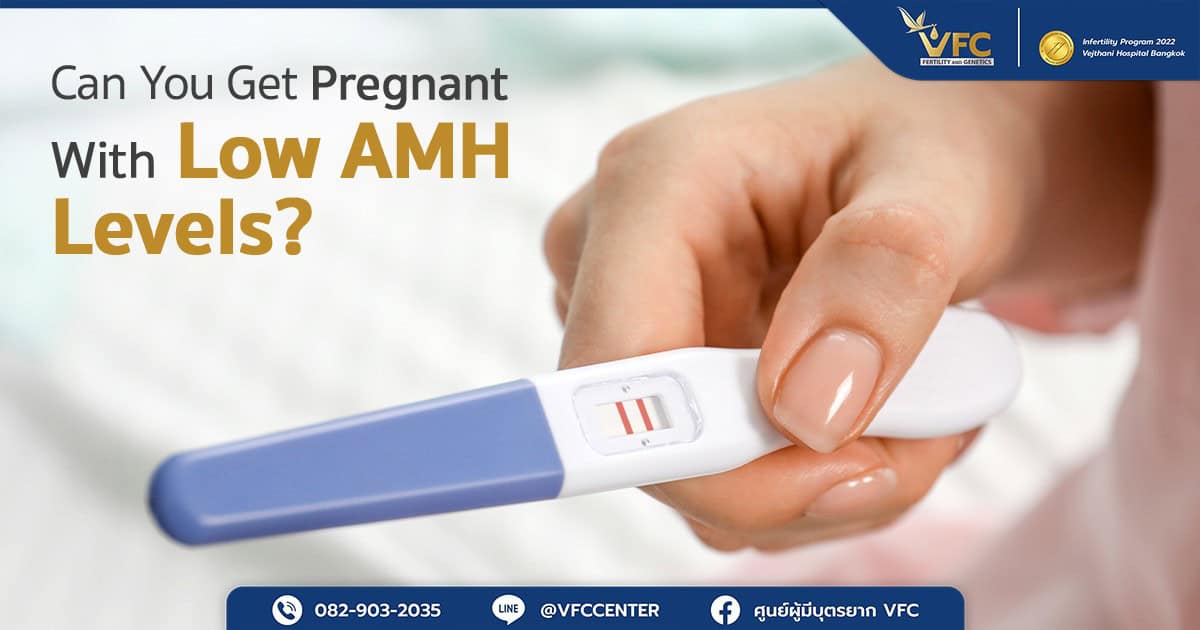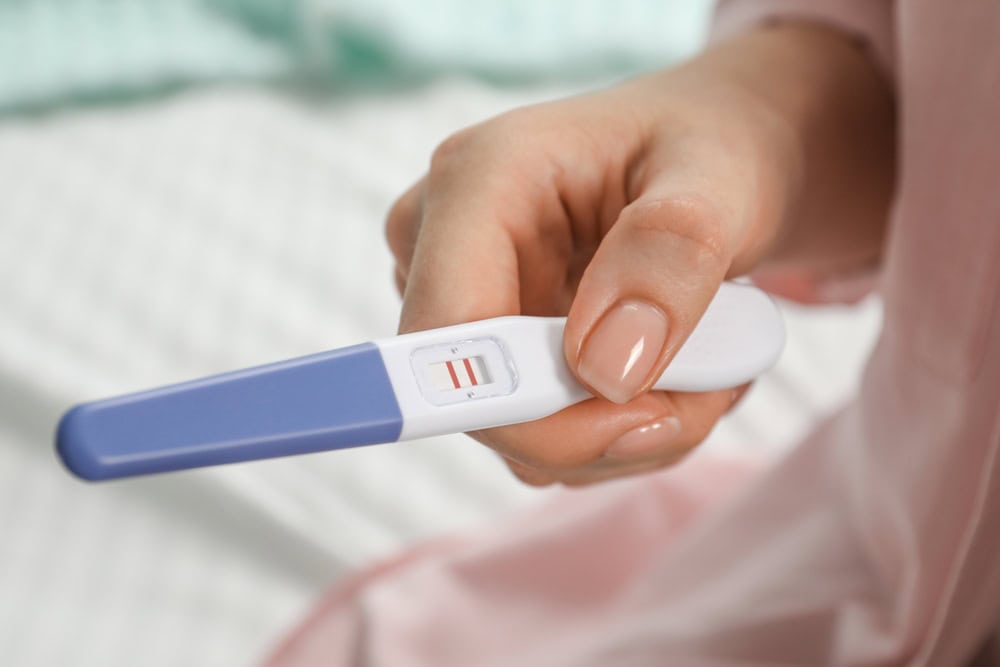
Anti-Müllerian Hormone (AMH) is a protein hormone produced by cells in the ovarian follicles. The number and quality of the remaining eggs is a crucial marker of a woman’s ovarian reserve. Understanding AMH levels is vital for assessing fertility and planning for pregnancy. For women wondering if they can get pregnant with low AMH levels, following a tailored IVF protocol can be essential in optimizing their chances.

Causes of Low AMH Levels
Low AMH levels can be caused by several factors. Here are some common causes:
Age: As a woman ages, her ovarian reserve naturally declines, leading to lower AMH levels. This is a normal part of the aging process.
Genetics: Some women are genetically predisposed to have a lower ovarian reserve, which can result in lower AMH levels.
Medical conditions: Certain medical conditions, such as endometriosis and autoimmune disorders, can affect AMH levels.
Lifestyle factors: Smoking, poor diet, and high-stress levels can negatively impact ovarian reserve and lower AMH levels.
Surgical interventions: Surgeries involving the ovaries, such as cyst removal or treatment for endometriosis, can reduce ovarian reserve and subsequently lower AMH levels.
Chemotherapy and radiation: Cancer treatments can damage the ovaries and significantly reduce ovarian reserve, leading to low AMH levels.
Premature ovarian insufficiency (POI): Also known as premature ovarian failure, POI is a condition where the ovaries stop functioning normally before the age of 40, often resulting in low AMH levels.
Understanding the underlying cause of low AMH levels can help in planning the appropriate fertility treatments and interventions to improve your chances of getting pregnant.
Understanding the Link Between AMH and Fertility
AMH is directly linked to fertility. Higher AMH levels generally indicate more available eggs, suggesting a higher chance of pregnancy. Alternatively, low AMH levels, often referred to as low ovarian reserve, can be a challenge for women trying to conceive.
How Are AMH Levels Measured?
AMH levels can be measured through a blood test and are typically classified as high, normal, or low. These levels help in understanding your reproductive health. Generally, AMH levels are interpreted as follows:
- High AMH Levels: Usually above 3.0 ng/mL. While this might suggest a high ovarian reserve, extremely high levels are sometimes associated with conditions like Polycystic Ovary Syndrome (PCOS), which can impact fertility.
- Normal AMH Levels: This level typically ranges from 1.0 to 3.0 ng/mL. This range is often considered a good AMH level for IVF as it suggests a healthy ovarian reserve.
- Low AMH Levels: Levels below 1.0 ng/mL may indicate a diminished ovarian reserve. While lower AMH levels can present challenges in IVF, successful pregnancies can still occur.

Understanding AMH Test Results
AMH test results help evaluate your fertility health. A result is considered ‘normal’ based on age-specific AMH levels. For instance, what is a good AMH level for an IVF procedure might differ from what’s considered normal for natural conception. AMH is just one indicator of fertility and doesn’t give a complete picture on its own. There are other factors, such as the quality of the eggs and overall reproductive health, are also crucial. Fertility specialists will consider AMH levels alongside other tests and personal factors to determine the best approach for fertility treatments.
Getting Pregnant With Low AMH
Can you get pregnant with low AMH? Despite low AMH levels, getting pregnant is still possible. Here are some strategies to consider:
- Timed intercourse: Understanding your menstrual cycle and timing intercourse during the most fertile days increases the chances of pregnancy with low AMH.
- Lifestyle adjustments: A healthy lifestyle involving proper nutrition, exercise, and stress management can positively influence fertility.
- Medical consultation: It is essential to consult a fertility specialist. They can provide personalized advice on how to increase AMH levels and treatment options based on your specific circumstances.
- Alternative therapies: Acupuncture and other holistic therapies have shown potential in improving fertility.
- Fertility treatments: Options like Intrauterine Insemination (IUI) or IVF might be recommended. The IVF protocol, in particular, can be effective for low AMH, as it allows for the direct fertilization of the egg outside the body.
Remember, each individual’s journey is unique, and what works for one may not work for another. Maintaining a positive mindset and seeking professional guidance are key to navigating this journey successfully.
How Can You Increase AMH Levels Naturally?
Here are practical tips on how to improve your AMH levels:
- Eat a nutritious diet rich in antioxidants, vitamins, and minerals. Focus on leafy greens, nuts, seeds, and whole grains.
- Consider supplements such as Vitamin D, Coenzyme Q10, and Omega-3 fatty acids may improve egg quality and ovarian health.
- Exercise regularly to improve overall well-being, which is linked to better fertility outcomes.
- Manage stress with yoga, meditation, or mindfulness, which can help maintain hormonal balance.
- Reduce exposure to toxins and limit contact with plastics, cosmetics, and non-organic produce.
Foods That Can Help You Increase AMH Levels
A well-balanced diet rich in specific nutrients can play a vital role in supporting and potentially increasing AMH levels, which are crucial for ovarian health and fertility. Incorporating a variety of nutrient-dense foods can help boost overall reproductive health. Here are some potential foods that can help you increase AMH levels:
- Leafy greens: Spinach, kale, and Swiss chard are packed with folate, iron, and antioxidants, all crucial for reproductive health.
- Nuts and seeds: Almonds, walnuts, flaxseeds, and chia seeds provide a healthy dose of fats and vitamin E, which are important for hormone regulation and egg quality.
- Whole Grains: Quinoa, brown rice, and oats are high in fiber and essential nutrients, which promotes overall well-being and potentially improves fertility.
- Berries: Blueberries, strawberries, and raspberries are antioxidant and vitamin powerhouses that support healthy cell function.
- Fish: Salmon, mackerel, and sardines are rich in Omega-3 fatty acids, which have been linked to improved egg quality and sperm health.
- Legumes: Lentils, chickpeas, and black beans are excellent sources of plant-based protein and iron, both vital for overall health and fertility.
- Eggs: Eggs are a good source of protein and essential nutrients like vitamin D, and they contribute to hormonal balance and fetal development.
- Citrus fruits: Oranges, grapefruits, and lemons are loaded with vitamin C and antioxidants, which can help improve sperm quality and protect against cell damage.
- Avocados: Rich in healthy fats and vitamin E, avocados can support hormonal regulation and improve egg quality.
- Dark chocolate: In moderation, dark chocolate can be a beneficial addition to your diet. It contains antioxidants that may boost overall health, although more research is needed to confirm a direct link to fertility.
IVF Protocol for Getting Pregnant With Low AMH

If you have low AMH levels and are struggling to conceive, it is important to consult a specialist at a fertility clinic. Seeking medical advice early can provide the best treatment options and increase the chances of a successful pregnancy.
For those with low AMH considering IVF, tailored protocols exist. These may include high-dose stimulation using higher doses of fertility drugs to stimulate the ovaries. You can opt to follow the natural cycle for IVF by leveraging the body’s natural cycle with minimal medication. Another option is to have pre-treatment with supplements to improve ovarian response.
Increase Your AMH Levels with the Experts at V Fertility Center
In Bangkok, Thailand, V Fertility Center is a premier destination for couples facing fertility challenges, including those with low AMH levels. If you are wondering whether you can get pregnant with low AMH levels, our specialist team is equipped with state-of-the-art technology and follows the latest IVF protocols for low AMH.
Our JCI-accredited center adheres to the highest healthcare quality and safety standards and provides personalized care. We understand the emotional and physical journey of couples undergoing fertility treatments with the aim of getting pregnant with low AMH or exploring other fertility solutions. VFC’s expert team is committed to helping couples achieve their dream of parenthood. Contact us today.

OBSTETRICS AND GYNAECOLOGY-REPRODUCTIVE MEDICINE





No Comments
Sorry, the comment form is closed at this time.